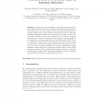Free Online Productivity Tools
i2Speak
i2Symbol
i2OCR
iTex2Img
iWeb2Print
iWeb2Shot
i2Type
iPdf2Split
iPdf2Merge
i2Bopomofo
i2Arabic
i2Style
i2Image
i2PDF
iLatex2Rtf
Sci2ools
CRITIS
2007
2007
A Malware Detector Placement Game for Intrusion Detection
We propose and investigate a game-theoretic approach to the malware filtering and detector placement problem which arises in network security. Our main objective is to develop optimal detector algorithms taking into account attacker strategies and actions. Assuming rational and intelligent attackers, we present a two-person zero-sum noncooperative Markov security game framework as a basis for modeling the interaction between the attackers who generate malware traffic on a network and a corresponding intrusion detection system (IDS). Thus, we establish a formal model of the detector placement problem based on game theory and derive optimal strategies for both players. In addition, we test the strategies obtained in a realistic agent-based network simulation environment and compare the results of static and dynamic placement scenarios. The obtained IDS strategies and the corresponding simulation results provide interesting insights into how to optimally deploy malware detectors in a net...
CRITIS 2007 | Detector Placement Problem | Malware | Optimal Detector Algorithms | Security Privacy |
| Added | 26 Oct 2010 |
| Updated | 26 Oct 2010 |
| Type | Conference |
| Year | 2007 |
| Where | CRITIS |
| Authors | Stephan Schmidt, Tansu Alpcan, Sahin Albayrak, Tamer Basar, Achim Müller |
Comments (0)

